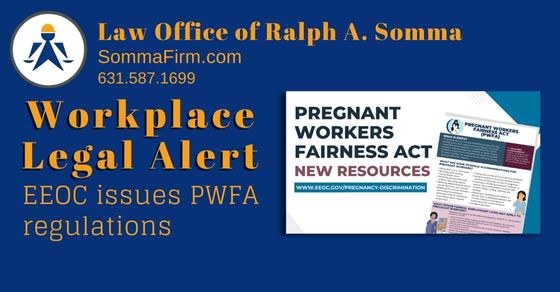As discussed in the February 2023 Workplace Legal Alert, the federal Pregnant Workers Fairness Act (PWFA) requires that employers with at least 15 employees provide a reasonable accommodation for known limitations of employees who have a physical or mental condition related to pregnancy or childbirth, unless it creates an undue hardship (significant difficulty or expense) on the employer’s operation. New York law has required employers of 4 or person provide such an accommodation since 2016.
The Equal Employment Opportunity Commission (EEOC) recently issued regulations, effective June 18, 2024, expanding on the obligations under the PWFA.
The regulations explain that, “pregnancy, childbirth, or related medical conditions” include, among others, current, past or potential pregnancy, lactation (breastfeeding and pumping), contraception, menstruation, infertility/fertility treatments, endometriosis, miscarriage, stillbirth, abortion, and pre-existing conditions exacerbated by pregnancy or childbirth.
The rule emphasizes that the PWFA covers conditions that do not rise to the level of “disability” under the Americans with Disabilities Act (ADA) – covered pregnancy-related conditions can be modest, minor, or episodic, such as morning sickness or migraines.
Another significant difference from the ADA is that the PWFA protects an employee who cannot perform an essential function, with or without a reasonable accommodation, for a temporary period of time provided the employee can perform the essential function “in the near future”, which, in the case of pregnancy, is generally 40 weeks from the start of the temporary suspension of an essential function. Thus, a temporary suspension or reassignment of an essential function must be considered and offered unless is poses an undue hardship. Requiring an employee to take leave when other accommodations are available will violate the PWFA.
The regulations provide several examples of potential reasonable accommodations and suggest the following are reasonable in most cases: (1) allowing an employee to carry water and drink as needed; (2) allowing an employee to take additional restroom breaks; (3) allowing an employee to sit or stand, as needed; and (4) allowing an employee to take breaks to eat and drink.
Finally, the regulations limit the medical documentation that can be requested of an employee to show pregnancy or the need for an accommodation.
To print this blog post click here.

About the Author: Ralph A. Somma
Ralph A. Somma is an experienced employment lawyer from Long Island, New York who has been practicing labor & employment law exclusively for over 30 years.
Call today (631) 587-1699 or click here to schedule a FREE telephone consultation.


Recent Comments